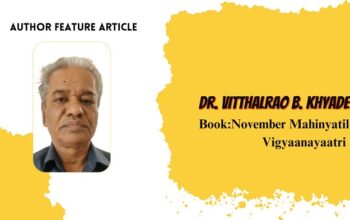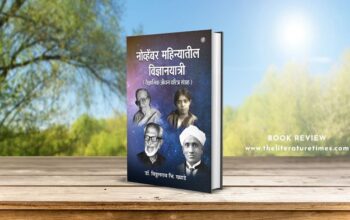The Ballad of the Universe by Abhilash Fraizer is a hauntingly lyrical and deeply philosophical novel that melds music, spirituality, and socio-environmental struggle into a singular literary experience. Published in 2024 by Writers International Edition, this compact 144-page work eschews conventional narrative structures in favor of a more meditative, poetic form, offering a story that is both emotionally resonant and intellectually provocative. Set primarily in the richly described landscapes of southern India—from the reflective solitude of Kanyakumari’s shores to the verdant forests of Idukki—the novel charts the inner and outer journey of Bharath, a musician silenced by a vow, as he grapples with personal grief, artistic purpose, and collective responsibility.
Fraizer’s choice of protagonist—a musician who has taken a vow of silence at the behest of his enigmatic guru—immediately places the reader within a world governed not by linear cause and effect, but by the rhythms and resonances of memory, emotion, and spiritual inquiry. Bharath’s crisis is both existential and artistic: after the death of his Master, Vishwanath, whose final words forbade him from singing, Bharath retreats from the world, tormented by the paradox of possessing a transcendent gift he must not use. His grief leads him to Kanyakumari, where the novel opens with an atmosphere heavy with melancholy, the “languid crescent moon” and “despondent darkness” echoing his emotional desolation. This opening scene sets the tone for the novel’s recurring juxtaposition of internal turmoil with the natural world, a relationship that Fraizer explores with philosophical nuance and poetic flair.
The narrative flows in a non-linear fashion, reminiscent of a musical raga, returning repeatedly to key motifs and emotional beats. This structure may challenge readers accustomed to a more straightforward chronology, yet it is fitting for a novel so concerned with the musicality of existence. Fraizer uses this form to good effect, allowing the story to unfold like a symphonic composition—part recollection, part dream, and part spiritual epiphany. The protagonist’s recollections of rigorous training under his Master, his tender yet unresolved relationship with the pragmatic Niranjana, and his eventual immersion in a tribal community all accumulate in layers, building toward a crescendo that is both personal and cosmic.
Bharath’s journey takes on a more grounded, activist dimension when he arrives in the forests of Idukki, where he encounters a tribal community on the brink of displacement by a powerful chemical corporation. This conflict introduces the novel’s engagement with environmental and social justice, but Fraizer integrates these themes without didacticism. Instead, they emerge organically from the story, as extensions of Bharath’s inner awakening. His art, once an inward pursuit of transcendence, becomes a tool for resistance. The climactic moment—when Bharath breaks his silence to perform a powerful concert in protest—serves as both a literal and symbolic unification of his personal healing and his social engagement. The performance, which appears to stir elemental forces and awaken the natural world itself, suggests that true art is not separate from the world’s pain but in dialogue with it.
One of the novel’s most distinctive and compelling features is its philosophy of “Cosmic Music.” Conceived as a mystical discipline by Vishwanath, it urges disciples to attune themselves to the subtlest sounds in nature—raindrops, birdcalls, the fizz of rivers—and transform these into music that transcends mere performance. The concept is at once fantastical and metaphysical, yet it is rendered with enough poetic clarity to resonate emotionally. This spiritualized vision of music as a bridge between the self and the universe lends the novel its title and its thematic heart. Through it, Fraizer offers a meditation on the interconnectedness of all life, the necessity of silence, and the revelatory power of listening—a counterpoint to a world increasingly defined by noise and disruption.
Fraizer’s prose is uniformly lyrical, often blurring the line between poetry and narrative. Descriptions of the natural world are not mere background details but serve as extensions of Bharath’s internal state. The forests, rivers, birds, and flowers pulse with a kind of sentient vitality, turning the setting into a character in its own right. His language is rich with sensory imagery, and his metaphors, though sometimes dense, evoke a visceral engagement with place and feeling. This lush prose style, however, may not be to every reader’s taste; at times, the density of description and introspection can feel overwrought, especially when narrative momentum slows. Yet for those willing to surrender to its rhythm, the novel offers a deeply immersive experience.
Characterization is another of the novel’s strengths, though not all characters receive equal attention. Bharath is a nuanced and compelling figure—ascetic, haunted, yet profoundly empathetic. His inner conflict, between fidelity to his Master’s teachings and the ethical imperative to use his voice in defense of the voiceless, makes him a deeply human character. Niranjana, his former lover, is less fully developed, functioning more as a symbolic counterpoint to his path of renunciation than as a fully realized character in her own right. Still, her persistent love and letters add an emotional dimension that complicates Bharath’s spiritual journey. Renju, a spirited tribal boy who forms a close bond with Bharath, brings warmth and innocence to the story, while Gopikrishnan, a friend who facilitates Bharath’s re-entry into the world, provides a voice of practicality and solidarity.
The novel concludes on an ambiguous note, with Bharath collapsing after his cathartic performance, leaving his fate uncertain. This open ending invites multiple interpretations—spiritual transcendence, physical exhaustion, or even symbolic rebirth—and reflects the novel’s commitment to ambiguity over resolution. For some, this lack of closure may feel frustrating, but for others, it will seem a fitting end to a story that resists easy answers and prioritizes emotional and philosophical depth.
Culturally, The Ballad of the Universe is a significant work. It situates itself firmly within the Indian literary tradition while addressing global concerns. Fraizer’s evocation of Kerala’s landscapes, rituals, and social dynamics provides rich cultural texture, yet the novel’s central themes—artistic integrity, ecological preservation, spiritual longing—are universally resonant. His background as an award-winning poet is evident throughout, particularly in his sensitivity to language and metaphor. The inclusion of a foreword by Prof. Irene Doura-Kavadia and contextual material about Fraizer’s creative journey further situates the novel within a serious literary framework.
Ultimately, The Ballad of the Universe is a novel that demands as much from its readers as it offers. It is a quiet but powerful book—one that sings not through action, but through emotion, atmosphere, and a deep conviction in the redemptive power of art. It will likely resonate most with readers attuned to poetic storytelling, spiritual inquiry, and social consciousness. For those willing to listen closely, to attune themselves to the novel’s subtle cadences, The Ballad of the Universe offers a rare and moving literary experience—a symphony of thought, feeling, and quiet rebellion.



